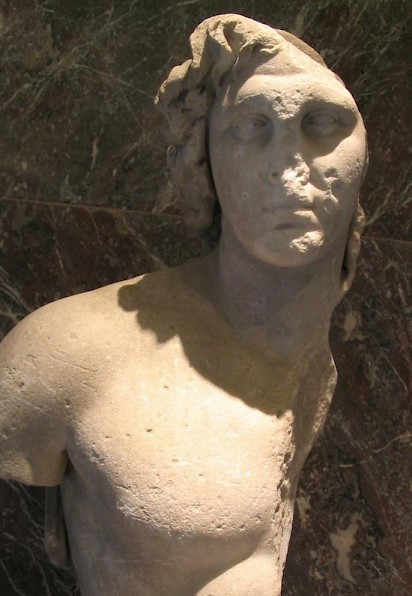Cleitarchus
Cleitarchus (last quarter fourth century BCE): early biographer of Alexander the Great.

Hardly anything is known about the life of Cleitarchus. He lived in Alexandria and was the son of a historian named Dinon of Colophon, the author of a Persian history that is now lost. And we know that Cleitarchus wrote a History of Alexander, that was very influential.
This book was finished between 310 and 301. (Probably in the first part of this period, because there is one clue that the account of Alexander's wars written by Ptolemy, which probably appeared after Cleitarchus' History of Alexander, was published before 301.) Perhaps, Cleitarchus started his research after this same Ptolemy, one of Alexander's generals and the future king of Egypt, had ordered Alexander's dead body to be brought to Egypt.
However this may be, Cleitarchus' main source may have been the work of Alexander's court historian Callisthenes of Olynthus. However, this work covered only the period until 329, and Cleitarchus added information from other sources; among these were the memoirs of Onesicritus of Astypalaea and Nearchus, Alexander's helmsman and his fleet-commander. Another source of information was available in Alexandria: there were many Macedonian and Greek veterans living in this city, and they must have told Cleitarchus about their adventures.
The result was -if popularity is an indicator- the most entertaining history of Alexander's conquests. It offered many vivid descriptions and eyewitness accounts, usually from a soldier's point of view. Cleitarchus' own book is now lost, but it was the source of Book 17 of Diodorus of Sicily's Library of world history and the History of Alexander the Great of Macedonia by Curtius Rufus. Because these authors often retell stories in almost identical words, we have a good idea of the History of Alexander. The following texts are examples:
- Curtius' description of the fall of Tyre, including a description of a mass crucifixion;
- Diodorus' account of the destruction of Persepolis;
- Curtius' report about the surrender of Babylon;
- Curtius' story of the Babylonian women, which may, in its ethnographic detail, be influenced by the Persian history of Dinon;
- Curtius' account of the crossing of the Hindu Kush.
These stories all go back to eyewitnesses. A man like the court historian Callisthenes would not write about the mass crucifixion at Tyre, and the history of Ptolemy -which was written from a commander's point of view- would not deal with the difficulties that the soldiers experienced in the Hindu Kush. To modern historians, the value of Cleitarchus (that is: Diodorus and Curtius) is the presence of these details, which would otherwise be unknown.
Another aspect of Cleitarchus' work that deserves to be mentioned, is the psychological portrait of Alexander, which is painted in dark shades. In Cleitarchus' opinion, the young king was corrupted by his constant good fortune and became an alcoholic, a tyrant, and a murderer. Modern scholars do not deny the facts that Cleitarchus mentions, but tend to give another interpretation. For example, according to Curtius/Cleitarchus, Alexander started to change after the death of his opponent king Darius III Codomannus of Persia; from then on there was no check on Alexander's vices. But many incidents that should prove this psychological development, can better be explained from the fact that Alexander had to behave as a Persian king if he wanted to be accepted by his new subjects.
Summing up, we can say that Cleitarchus' work combined vivid descriptions, eyewitness accountants and a dark psychological portrait of Alexander. He also delights in fantastic tales and he sometimes sacrificed historical reliability to keep the story entertaining and to stress the psychological development. Therefore, Cleitarchus' History of Alexander contains many errors (some serious).
Cleitarchus' work is often called 'the vulgate' (Diodorus and Curtius Rufus being 'the vulgate tradition'). It is indeed a popular story: its contains romantic details, a convincing (but incorrect) psychological portrait, fantastic stories. It is certainly not a bad source, but as we shall see below, modern historians prefer the account of Arrian of Nicomedia, which is based on terse primary sources like Ptolemy and Aristobulus. These are called the 'good' tradition.